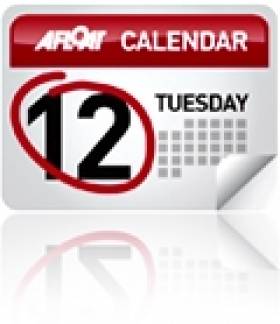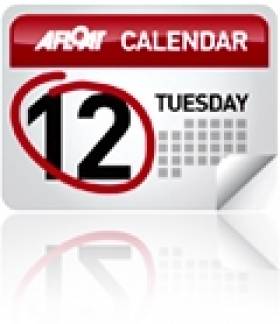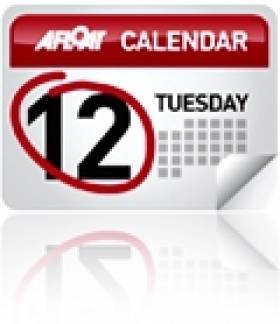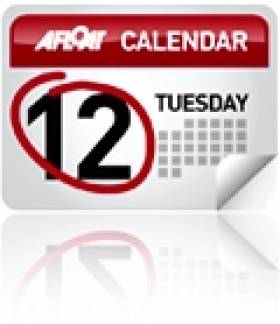Displaying items by tag: Below the Surface
Below the Surface Lecture Series: ‘Norse Dublin - The Fleet of Norse Dublin around 1000AD’
#LectureNorseDublin: The next and final monthly held 'Below the Surface' lecture the "Norse Dublin - The Fleet of Norse Dublin around 1000AD" is to be held on Wednesday 3 April (starting 8pm).
The talk to be presented by Professor Poul Holm TCD, who will mark the end of the Below the Surface series which began last November. The unique lecture series has provided the public an opportunity to attend and enjoy in celebrating Ireland's maritime heritage and archaeology.
As usual the talk is to take place on the famine replica ship, the Jeanie Johnston, docked at Custom House Quay in Dublin's city-centre. The venue provides an intimate space ideal for maritime tales, oozing seafaring ambience with the creaking sounds of the hull surrounding the audience.
The talks to date have touched on many aspects of our rich and controversial maritime history, from tales of pirates, queens and lost polar expeditions.
Tickets are available online by visiting: http://jeanie.visrez.com/engine/event/57
Below the Surface Lecture: ‘The Opening of the Atlantic World’
#Lecture -The next 'Below the Surface' series of monthly held maritime lectures is 6 March. The topic will be 'The Opening of the Atlantic World' – English Settlement in Ireland and North America in the 17th Century, by James Lyttleton.
As usual the lecture takes place below decks on board the replica 19th century famine emigrant barque, Jeanie Johnston, at her berth at Custom House Quay, in Dublin's Docklands.
Doors open at 7.15pm and the lecture starts at 8pm. Please ensure to arrive early as entry to venue may not be permitted on commencement of the lecture.
For further details contact 01 4730111 and to book online, tickets costing €15.00 per person click HERE.
Below the Surface Lecture Series: ‘Piracy and Predation’
#LecturePIRACY: Continuing the 'Below the Surface' of maritime lectures held monthly, the next talk is on 6 February, the topic will be 'Piracy and Predation in early 17th Century Ireland' presented by Connie Kelleher Phd, A Historical and Archaeological overview.
As usual the lecture takes place below decks on board the replica 19th century famine emigrant barque, Jeanie Johnston, at her berth at Custom House Quay, in Dublin's Docklands.
Doors open at 7.15pm and the lecture starts at 8pm. Please ensure to arrive early as entry to venue may not be permitted on commencement of the lecture. For further details contact 01 4730111 and to book online, tickets costing €15.00 per person click HERE.
Jeanie Presents Gifts Out of the Bottle
#TALLSHIP EVENTS– Once again the unique venue of the tallship Jeanie Johnston plays host to maritime heritage lectures and live music sessions throughout early 2013,writes Jehan Ashmore.
Resuming the 'Below the Surface' lectures series on 2 January will be a talk about Grace O'Malley - Ireland's Maritime Icon, one of history's most extraordinary mariners, presented by Anne Chambers.
A month later on 2 February, Juliet Turner a singer/songwriter from Tummery, near Omagh, launches the inaugural session of the New Year. In the course of her career she has opened up for artists among them Bob Dylan, U2 and Bryan Adams. Other performers lined-up for the Jeanie Sessions are Caroline Moreau and The Dunne & Hernandez Duo.
So if you are looking for a gift idea for the history buff or music lover in your life then perhaps consider as a stocking filler, which are available to purchase. For further information on lecture and gig tickets visit: www.jeaniejohnston.ie/events-page.html
The 'Jeanie' is berthed at Custom House Quay close to the Sean O'Casey foot-bridge in Dublin's city centre. In addition the replica 19th century barque is also a museum which tells the story of mass emmigration during the famine.
Below the Surface Lecture: Sir Ernest Shackleton – a Family Perspective
#JEANIE LECTURES – Having started this month, the 'Below the Surface' series of six lectures is a celebration of Ireland's maritime heritage and archaeology. They are held on the first Wednesday of each month on board the replica 19th century barque Jeanie Johnston in Dublin Docklands. The next lecture on 5th December is about Sir Ernest Shackleton, one of Irelands greatest polar explorers.
The talk presented by historian and guide - Jonathan Shackleton will give a unique insight by delving into his family background of the polar explorer and for his reputation and growth in four expeditions to Antarctica.
Doors open at 7.15pm (lecture starts 8pm) and those attending will experience an intimate space ideal for maritime tales, oozing with seafaring ambience with the creaking sounds of the hull.
It is advisable to arrive early as entry to venue will not be possible upon commencement of the lecture venue. The emmigrant famine museum ship is berthed alongside Custom House Quay. To book online tickets costing €15 each, click the link HERE
All Aboard the 'Jeanie' As Lecture Series Sets Sail
#LECTURES – "Below the Surface" is a new series of six monthly held maritime lectures which are aptly to take place on board the replica barque Jeanie Johnston. The tallship built in Blennerville a decade ago, is now a floating famine museum ship berthed at Custom House Quay in Dublin's Docklands.
The talks will touch on many aspects of our rich and controversial maritime history, from Viking fleets in Dublin bay, through pirates, queens and lost polar expeditions. All told in a most charming setting, while the River Liffey gently sways the hull beneath your chair.
All the lectures will be held on the first Wednesday (8pm) of every month, with the inaugural talk "Searching For Franklin" on 7 November. This will be presented by John Murray, who will examine the ill fated exploration to find the Northwest Passage, undertaken by Captain John Franklin .
Tickets are available online at www.jeaniejohnston.ie/below-the-surface-page.html For further information on the series click HERE





























































